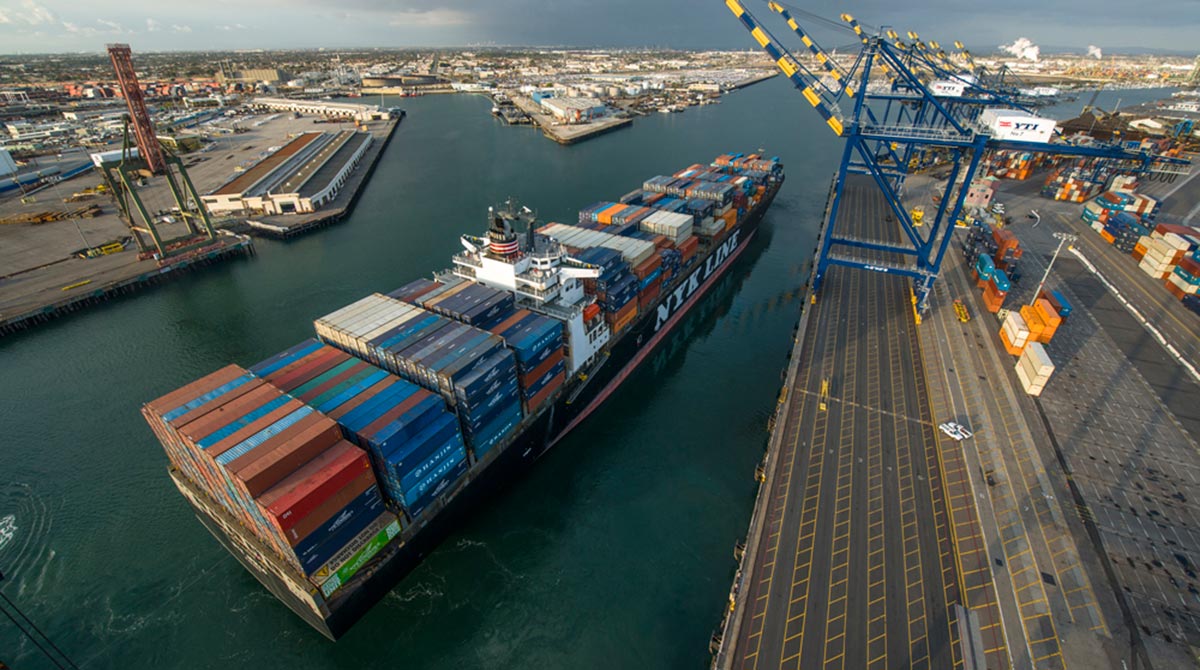California Ports Users Question New Appointment System

Truckers and shippers welcomed the concept — but worried about the implementation — of a new appointment system for in-terminal container pickups at 10 terminals in the largest U.S. port complex.
A statement by PierPass, a coalition of terminal operators in the Los Angeles-Long Beach, California port complex, said 10 of the ports’ 13 container terminals agreed “on a coordinated initiative to establish appointment systems” to combat ongoing delays that have nearly doubled the time truckers spend inside terminals to pick up or drop off loads.
“We support efforts that are attempting to address the congestion problems,” Curtis Whalen, executive director of the Intermodal Motor Carriers Conference of American Trucking Associations, told Transport Topics on Sept. 1. “The challenges in California are always magnified because of the sheer size of the operations. There hasn’t been a lot of collaborative work between terminal operators and truckers.”
Because there are so many individual information and operational systems, he said, “That gives us a very small comfort factor that the coordination necessary to meet this very difficult challenge can be achieved.”
On the shipper side, the National Industrial Transportation League also is focused on the promise and pitfalls.
“What’s missing in this arrangement is a requirement for uniformity across the participating systems giving rise to fears of 10 separate systems,” the shipper trade association’s statement said.
“The increasing number of containers unloaded by larger new ships has put the traditional random-access system — where any truck can arrive at any time to pick up any container — under strain,” PierPass President John Cushing said. “Appointment systems are part of the growing set of tools terminals are embracing to fight congestion and reduce turn times.”
All 10 of the operators, which together handle 87% of the ports’ cargo, have agreed to make appointments mandatory at all times and to provide accessibility to appointment systems through PierPass.
PierPass officials said appointments will add supply chain predictability and reduce queues at entry gates. The move also will speed up terminal activity by matching truck appointment times to pickups of specific batches of containers instead of having one truck pick up a single box at a random time.
Five of the 10 terminals have appointment systems now. Two terminals at Los Angeles and one at Long Beach aren’t participating in the program, a PierPass spokesman said.
PierPass also administers programs to direct cargo to the docks during off-peak hours, when the terminals can be accessed without paying a $135 entry fee.
Whalen cited a particular challenge in the absence of a single system for truckers to set appointments at every terminal and the need for flexibility. For example, he said problems beyond a trucker’s control, such as unexpected traffic delays, can make it difficult for an appointment system to work in spite of everyone’s best intentions.
Only imports are covered by the new plan announced late in August.
The PierPass announcement said that participants will continue to study how to apply an appointment system to exports. They account for about one-third of container shipments through the two ports, based on cargo statistics.
The PierPass statement also said one of the terminals where ap-pointments were introduced last year has seen “a marked decline in queuing at our gates and better turn times for our truckers.”
Meanwhile, the Federal Maritime Commission hadn’t decided at press time whether it would allow an off-peak container terminal program to take effect in Oakland, California.
Several weeks ago, terminal operators there disclosed their intentions to keep terminals open for at least one additional shift, probably on Saturdays.
The regulatory agency had until Sept. 7 to decide whether to let the Oakland program proceed or delay implementation for 45 days while FMC gathered more information.
The terms, such as fees for peak use and incentives for off-peak use, still haven’t been determined.
Whalen commended FMC, the only U.S. government agency with clear jurisdiction over port activities, for increased involvement in port terminal issues.

